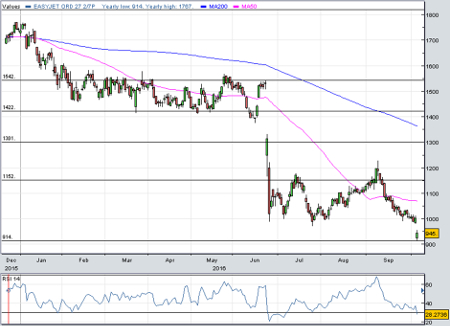Why easyJet just crashed again
6th October 2016 12:41
by Lee Wild from interactive investor
Share on
We already knew that "major external shock events and disruption" had hammered profits at , and now the City is marking down expectations for 2017. A sharp fall in revenue per seat caused investors to bail out, and shares in the budget airline plummeted as much as 9% Thursday to their lowest since January 2013.
Chief executive Carolyn McCall warned late June that easyJet would make much less than forecast in the year to September. Numis Securities chopped pre-tax profit estimates from £612 million to £495 million in response. McCall still thinks that's about right, but many investors had hoped for better and business remains difficult.
A record 22 million travellers used easyJet in the fourth quarter, with a load factor of 93.9%, so its planes are well-filled. However, revenue per seat at constant currency fell by 8.7%, and we're told to expect a similar reduction over the next three months. While lower fuel prices mean carriers can afford to run more flights, they're forced to cut fares to compete.

Terrorism has caused major problems for the entire travel industry, and the Egyptair tragedy affected demand. Strike action by French air traffic controllers also cancelled thousands of flights and cost easyJet £28 million in the third quarter we heard in July.
And, while a 1.1% drop in fourth-quarter cost per seat was positive, the pound's plunge to a 31-year low versus the dollar has wiped another £35 million off the bottom line since the EU referendum in June. Over the 12 months, currency fluctuations have lost easyJet £90 million. We're warned to expect a similar hit in 2017.
"We have been disproportionately affected by extraordinary events this year but our excellent network, cost control and revenue initiatives and our strong balance sheet underpin our confidence in the business," McCall said Thursday.
She'll keep investing in the business, too, although spending cash on "operational resilience" and waiting for savings to come through will nudge costs up by 1% this financial year.
Rival Ryanair is actually tipped to keep growing profits fast, despite facing the same problemsNumis analyst Wyn Ellis has seen enough. He's cut pre-tax profit forecasts for the year to September 2017 from £495 million to just £400 million, reflecting "continuing yield pressure and further foreign exchange headwinds".
That also implies a second year of falling profits at easyJet and, because the company promises a payout ratio of 50% of post-tax income, the dividend will likely suffer as well. Expect just 40.3p in 2017.
Ellis, who expects revenue per share to be down around 4%, pencils in a drop in earnings per share (EPS) to 109p in 2016 from 138p a year earlier, then to 80.7p for the current financial year.
After today's fresh share price slump, easyJet trades on a forward price/earnings (PE) ratio of 11.6 times. That's a significant de-rating, but it's still not much less than , which is actually tipped to keep growing profits fast, despite facing the same problems.
Ellis thinks easyJet will make it back to 1,200p in time. It probably will, but Ryanair is still improving margins and boasts industry-leading cash generation. That makes the Irish carrier the pick of the bunch right now.
This article is for information and discussion purposes only and does not form a recommendation to invest or otherwise. The value of an investment may fall. The investments referred to in this article may not be suitable for all investors, and if in doubt, an investor should seek advice from a qualified investment adviser.